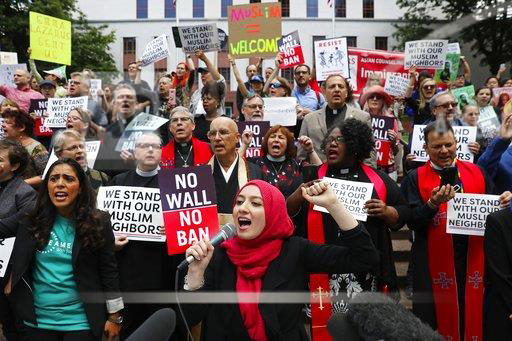
Varisha Khan, front and center, director of the Muslim committee at OneAmerica in Seattle, leads a chant during a protest and news conference by CAIR-Washington and other organizations upset by the Supreme Court’s decision to uphold President Trump’s travel-ban in downtown Seattle. (Photo by Ken Lambert/THE SEATTLE TIMES)
WASHINGTON (AP) — A sharply divided Supreme Court upheld President Donald Trump’s ban on travel from several mostly Muslim countries on June 26, the conservative majority taking his side in a major ruling supporting his presidential power. A dissenting liberal justice said the court was making a historic mistake by refusing to recognize the ban discriminates against Muslims.
The 5-4 decision was a big victory for Trump in the court’s first substantive ruling on one of his administration’s policies.
In a statement, the Japanese American Citizens League (JACL) said, “This is exactly the logic that allowed 120,000 Japanese Americans to be incarcerated during World War II. JACL is deeply disappointed that the Supreme Court has misinterpreted the lessons from (Fred) Korematsu, (Gordon) Hirabayashi, and (Minoru) Yasui.”
Karen Korematsu, daughter of Fred Korematsu and the founder and executive Director of the Fred T. Korematsu Institute said, “My father spent his life fighting for justice and educating people about the inhumanity of the Japanese American incarceration, so that we would learn from our mistakes. Although he would be somewhat glad his case was finally overruled, he would be upset that it was cited while upholding discrimination against another marginalized group. The court’s decision replaced one injustice with another nearly 75 years later.”
Fred Korematsu was arrested in San Leandro, Calif., his home town, for defying an executive order that led to the imprisonment of Japanese Americans the Pearl Harbor bombing.
He later went to the Supreme Court to fight it — Korematsu lost in 1944 and, although his criminal conviction was vacated in 1983, the case was not overturned.
Until last week.
“Korematsu may be overruled, but it’s not to be celebrated,” said Karen Korematsu. “Unfortunately with this decision, we are continuing to repeat history.”
Chief Justice John Roberts wrote the majority opinion for the five conservative justices, including Trump nominee Neil Gorsuch, who got his seat only after Republicans blocked President Barack Obama’s nominee for the last 10 months of Obama’s term.
Roberts wrote that the travel ban was well within U.S. presidents’ considerable authority over immigration and responsibility for keeping the nation safe. He rejected the challengers’ claim of anti-Muslim bias that rested in large part on Trump’s own tweets and statements over the past three years.
But Roberts was careful not to endorse either Trump’s statements about immigration in general or Muslims in particular, including his campaign call for “a complete and total shutdown of Muslims entering the United States.”
“We express no view on the soundness of the policy,” Roberts wrote.
The travel ban has been fully in place since December, when the justices put the brakes on lower court rulings that had ruled the policy out of bounds and blocked part of it from being enforced. It applies even to people with close relatives in the United States and other strong connections to the country.
In a dissent she summarized aloud in court, Justice Sonia Sotomayor said, “History will not look kindly on the court’s misguided decision today, nor should it.” Justices Stephen Breyer, Ruth Bader Ginsburg and Elena Kagan also dissented.
Sotomayor wrote that based on the evidence in the case “a reasonable observer would conclude that the Proclamation was motivated by anti-Muslim animus.” She said her colleagues in the majority arrived at the opposite result by “ignoring the facts, misconstruing our legal precedent and turning a blind eye to the pain and suffering the Proclamation inflicts upon countless families and individuals, many of whom are United States citizens.”
She likened the case to the discredited Korematsu V. U.S. decision that upheld the detention of Japanese Americans during World War II. Roberts responded in his opinion that “Korematsu has nothing to do with this case” and “was gravely wrong the day it was decided.”
The travel ban was among the court’s biggest cases this term and the latest in a string of 5-4 decisions in which the conservative side of the court, bolstered by the addition of Gorsuch last year, prevailed. He was chosen by Trump after Republicans in the Senate refused to grant a hearing to federal appeals Judge Merrick Garland who was nominated by Obama in March 2016.
Federal trial judges in Hawaii and Maryland had blocked the travel ban from taking effect, finding that the new version looked too much like its predecessors. Those rulings that were largely upheld by federal appeals courts in Richmond, Virginia, and San Francisco.
But the Supreme Court came to a different conclusion last week. The policy has “a legitimate grounding in national security concerns,” and it has several moderating features, including a waiver program that would allow some people from the affected countries to enter the U.S., Roberts said. Through April, the administration has granted waivers to less than 2 percent of visa applicants — 579 out of 33,176 — since the ban took effect. An additional 1,147 got visas through other means such as diplomatic or pre-existing refugee status.
Roberts wrote that presidents have frequently used their power to talk to the nation “to espouse the principles of religious freedom and tolerance on which this Nation was founded.” But he added that presidents and the country have not always lived up “to those inspiring words.”
The challengers to the ban asserted that Trump’s statements crossed a constitutional line, Roberts said.
“But the issue before us is not whether to denounce the statements. It is instead the significance of those statements in reviewing a Presidential directive, neutral on its face, addressing a matter within the core of executive responsibility,” he said.



